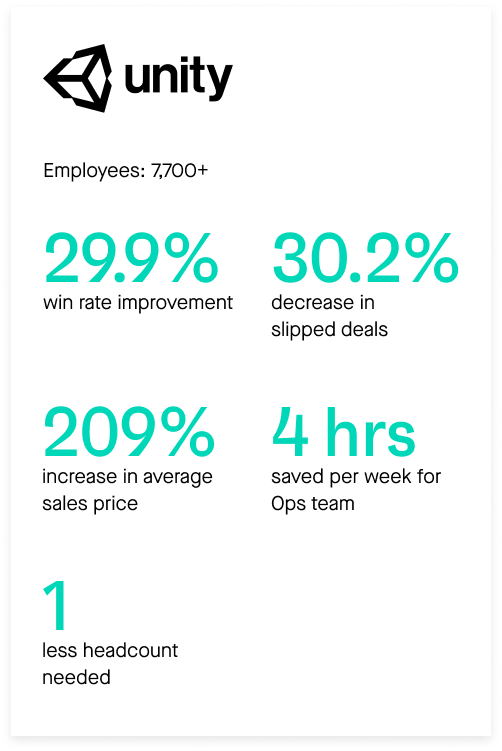29.9% win rate improvement
30.2% decrease in slipped deals
209% increase in average sales price
Those are all stats Clari’s Value Engineering team attributes to Unity — the “world’s leading platform for creating and operating interactive, real-time 3D content” — since implementing Clari.
Causal correlation is nearly impossible to prove, but “The Clari Effect” has definitely had a positive impact on sales at Unity.
So what did things look like at Unity before Clari?

Challenge: “Salesforce and spreadsheets” were not scalable as the business grew Clari has helped
That’s how Unity ran sales forecasting before Clari: Salesforce and spreadsheets.
Laura Palmer, Unity’s Global Vice President of Sales, arrived on the job without a true forecasting solution. “We had Salesforce but did not have the forecasting module implemented.” And Salesforce itself just “felt like an overwhelming amount of data.”
Laura’s team members sent her spreadsheets in various formats, depending on region or group. “I could not walk into my CRO’s office and have a logical conversation about pipeline and forecast,” she said.
“Before Clari, I was literally flying blind.”
Unity was preparing the IPO process when it implemented Clari, so “having that predictability was really helpful — really, really crucial,” Laura said.
Clari saved time, positively impacted win rates, and helped identify slipped deals early in the process.
As Laura shared, “Clari is the place. The only thing I use now is Clari. I do not go into Salesforce unless approval on a deal is needed, and that's the only thing that brings me there.”

Solution: Clari — all day, every day
Before Clari, Laura wanted to “throw a computer at the wall” when she was doing forecasting.
Fast forward to today, and she is in Clari every day, reviewing the forecast, seeing what’s changed, and more. “Clari is so easy. A definite improvement.”
Jimmy Mok, Senior Manager of Sales Operations at Unity, agrees. “The time savings is huge, as is the ease of use.” He specifically loves being able to drill into specific opportunities and automatically rolling up forecasts.
The RevOps team predicts Clari has helped save them an average of four hours per week.
Raphael Ruland, Unity’s Global Vice President of Sales, echoes what staff has shared about forecasting. He loves the instant visibility into how various teams are doing (new business vs. renewals).
“I can see how teams are forecasting for the various components of our business, what pipeline coverage actually looks like, where we are slipping, and more. I spend a significant chunk of my time in Pulse and Waterfall to understand how deals are shifting.”
The ways in which Clari helps with consistency is equally crucial for Raphael. With about 100 sellers on the team, he’s responsible for driving consistency across how they operate as a business — how they forecast, log opportunities, and more.
This consistency (and accuracy, of course) gives Raphael the necessary confidence to roll up the numbers and share them with the C-suite.
Better visibility into slipped deals and revenue leak
Slipped deals are often an indicator of the breakdown in the sales process, how the team qualifies a deal, and/or forecasting methodology.
Clari shows Unity where the slip happened. Beginning of the quarter? Middle? End? From there, they work with sales leaders on how to better qualify deals — in some ways, going back to basics.
Clari has also helped Unity spot revenue leak.
As we’ve written before, revenue leak refers to revenue your organization has earned or counted on earning but has not captured. This can be due to various factors, such as deal slippage, broken handoffs, bad data, manual processes prone to human error, and more.
When Laura first joined Unity, she was “very worried” about renewals. As a sales leader, it can be frustrating because, for every deal that does not renew, the team has to make up for it with net new business. This adds unnecessary pressure to her new business reps and leaders.
Today, Unity uses Clari to identify revenue leak. Specifically:
- Lost reason analysis: Where are deals being lost (and why)?
- “Stuck” deals: Deals that exist but are not moving.
Insights gained from Clari are informing conversations and decisions that the marketing and product teams are making.
Clari is the single source of truth
With Clari, Unity now has all forecasting-related data in one location.
The team can then cascade that level of focus and consistency across the entire organization. “Everybody's effectively moving in the same motion, filling out the same information ... forecasting the same way, and then ultimately it becomes an execution side business,” said Raphael.
Raphael leans heavily on Clari as a reliable data point to triangulate with a few other data sources to come up with a final forecast number — one he’s proud to say is very accurate.
On top of that, Clari makes it a lot easier to extract data, summarize it, and then ask people to provide feedback to determine actions for how we move forward.
Unity is now “highly dependent” on Clari
Unity is excited about the future of the business with Clari on its side.
“Clari is a no-brainer,” said Laura. “The platform makes everybody more productive because they're not spending as much time with administrative work.”
Her team is now “highly dependent” on Clari for sales forecasting visibility. It’s made a “huge difference” for all who touch revenue.
Jimmy echoed those sentiments. “Clari is a great platform. It makes forecasting so much easier for the sales reps. I would definitely steer those currently using Google Sheets or Excel towards Clari. If we didn't have Clari, we would need an additional headcount just to roll up all the numbers.”
Finally, remember Unity’s pre-Clari world? Salesforce and spreadsheets.
Thanks to Clari, Raphael is now less reliant on checking Salesforce. He uses Clari exclusively to manage the overall business as much as possible.
